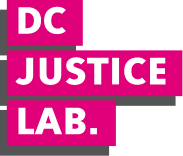
restorative justice in schools
If fully implemented, restorative justice would help end the cycle of trauma and violence in schools.
- 4 Minute Read
Restorative justice provides a trauma-informed, holistic approach to navigating student conflicts and building safe school communities. Schools that have implemented restorative justice have seen improvements in students’ behaviors and safer schools. DC committed to expanding restorative justice programming in schools in 2015, to help improve school climate, address the trauma young people experience that contributes to a cycle of violence, and reduce the significant disparities seen where Black students are 67 percent of the DC public school population but represented 92 percent of suspensions. But this commitment to have restorative justice programs in all DC schools has not been fully realized with only 12 out of 117 DC public schools establishing these programs in the way they were supposed to be set up.DC should pass legislation to increase schools’ capacity to deliver restorative justice programs and fully fund these initiatives.

What you need to know
Young people experience trauma that contributes to a cycle of harm that continues in school.
In 2021, 7.4 percent of DC children and youth were victims of or witnesses of violence in their immediate communities, almost double the national average. That same year, half of Black non-Hispanic children and 42 percent of Latino children living in DC experienced an Adverse Childhood Experience (ACE) – a traumatic event that permanently impacts a young person’s development. Research has found that for every additional ACE category a youth experiences, the risk of violent behavior increases from 35 percent to 144 percent. Young people with three or more ACEs are five times more likely to have attendance issues and six times more likely to have behavior problems at school. The result of not addressing this trauma is a significant percentage of young people experience violence in schools and say school is unsafe: according to the Centers for Disease Control, 7 percent of young people experience being “threatened or injured with a weapon at school,” and 9 percent say they did not go to school because of safety concerns in 2021.
To address trauma and increase safety, DC committed to expanding restorative justice in schools.
Since 2015, the DC Office of the State Superintendent of Education (OSSE) has said it would build restorative justice practices in schools to engage young people in conflict resolution and improve school cultures. Nonprofit projects like SchoolTalk’s RestorativeDC contracted with OSSE to establish restorative practices, largely through training. The Restorative Justice Practice Guide says restorative justice practices should develop facilitated processes that resolve conflicts through empathetic listening, support circles where a counselor helps students talk through an issue, and mindfulness practices. The process is designed to give students involved in a conflict the opportunity to be heard, allow a student to take accountability and repair the harm caused, and the response to the behavior should focus on maintaining a safe school environment. The Guide notes, “If restorative practices are implemented consistently, they can also decrease the frequency of disruptions and disciplinary issues that can occur during the school year.”
DC has not expanded restorative justice to scale in DC schools.
As of the 2021-2022 school year, OSSE showed that only 12 out of 117 DC public schools received assistance from a RestorativeDC consultant with “fidelity to the model” – that is, were trained or established restorative justice programs in the way that they were supposed to be set up.. The District also lacks the types of counselors that would help restorative justice work in schools: DC ranked 43rd out of 51 jurisdictions on its ratio of counselors to students. Recent research suggests that it would only cost $139 per student to develop a restorative justice practice at the scale needed in a school – about $1.35 per student per day of the school year.
DC Council has opportunities to grow restorative justice in schools.
In March 2023, Councilmember Zachary Parker introduced the School Safety Enhancement Amendment Act of 2023. The bill would direct OSSE to convene stakeholders to create guidelines that would be used to review and enhance school safety plans; establish new positions of School Safety Directors and Assistant Directors at every high school; require DC to create more robust systems for emergency agencies to share critical information with schools and child development centers. In January 2024, the DC Council heard directly from over 60 students, school leaders, and nonprofit organization leaders about the importance of this bill. This bill is under review. Individuals who testified on the legislation said that the budget would need to include $26 million to hire the new Safety Directors and that these funds could be diverted from what DC has traditionally spent to have police in schools.
Expanding restorative justice in schools would reduce racially disparate arrests of students in DC schools.
Studies of schools that have implemented restorative justice practices have shown a 35 percent reduction in student arrests in school and a 15 percent reduction in out-of-school student arrests. The researchers also saw declines in arrests for both violent and non-violent offenses. In addition to significant decreases in student arrests, restorative justice practices decreased out-of-school suspensions by 18 percent and improved students’ perceptions of school climate. The impact of such suspensions, expulsions, and arrests disproportionately impacts Black students: in the 2018-2019 school year, Black students made up 67 percent of the DC public school population but represented 92 percent of suspensions.
WHERE TO LEARN MORE
EdSource June 2022
Justice Policy Institute October 2023
Learning Policy Institute February 2021
Our Solutions
DC Should:
- Pass the Student-Supported School Safety Enhancement Amendment Act of 2023
- Fully fund school restorative justice programs to the scale needed in DC schools.
special thanks
Jason Ziedenberg ★ Patrice Sulton ★ Ella Moore




